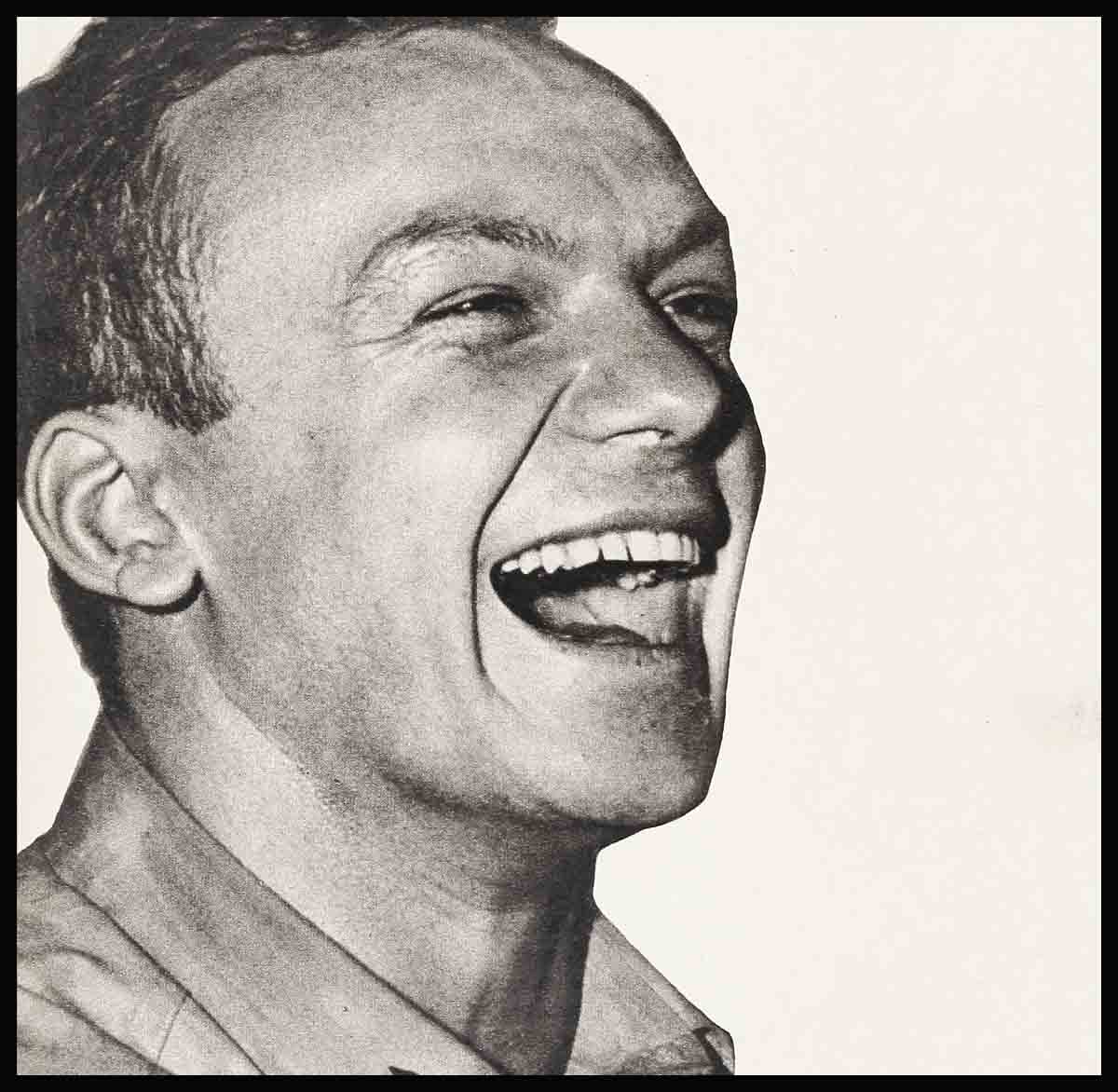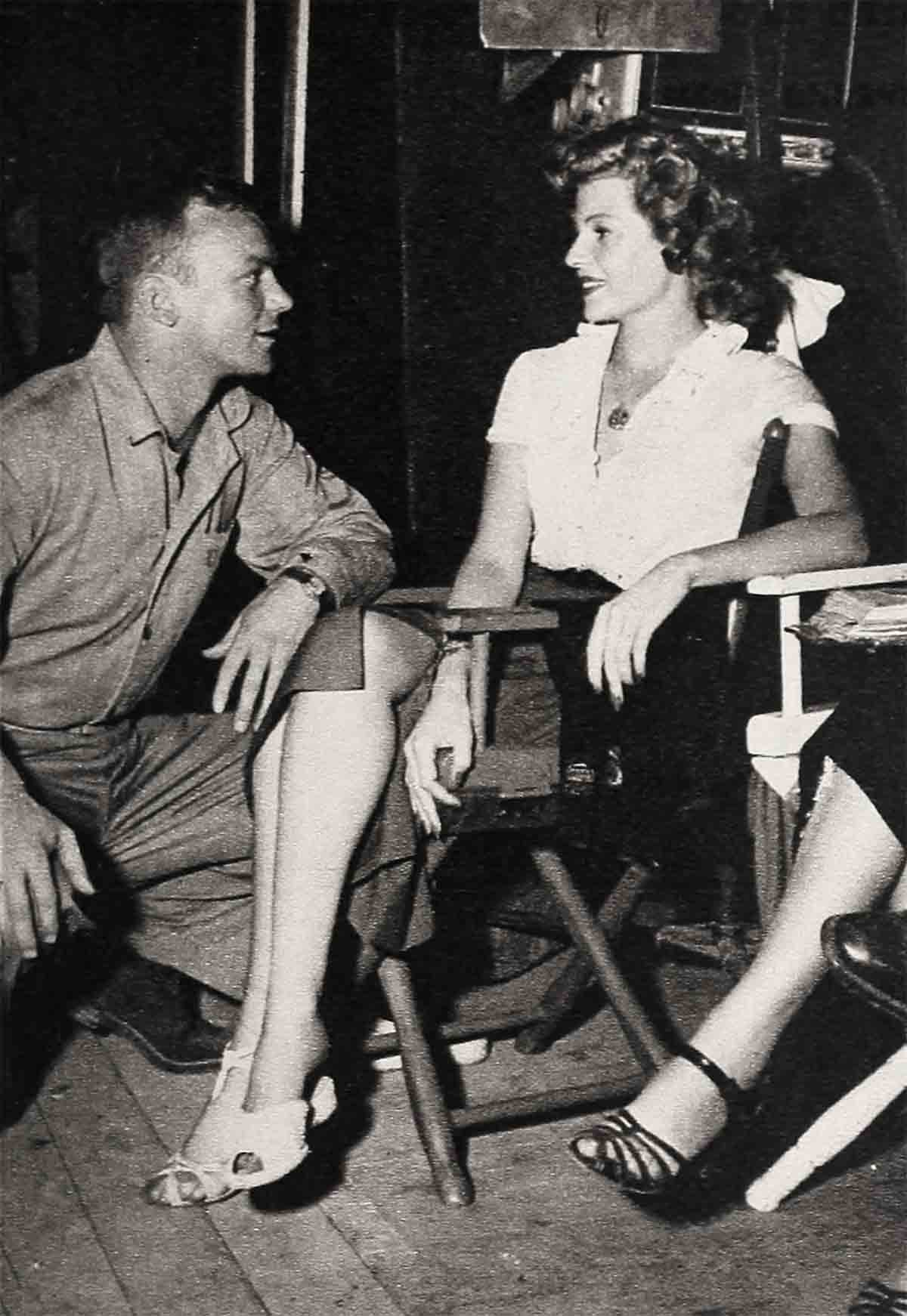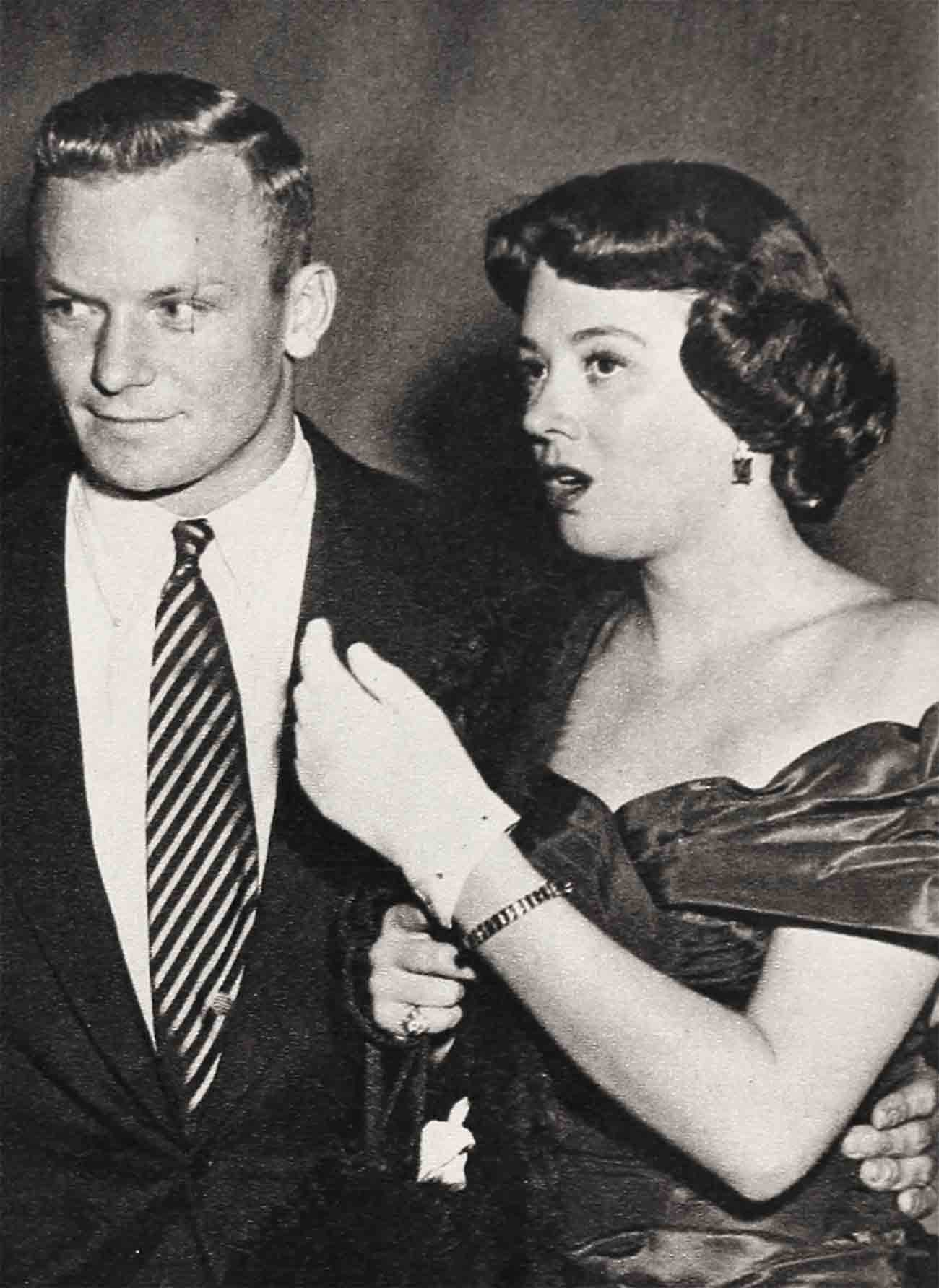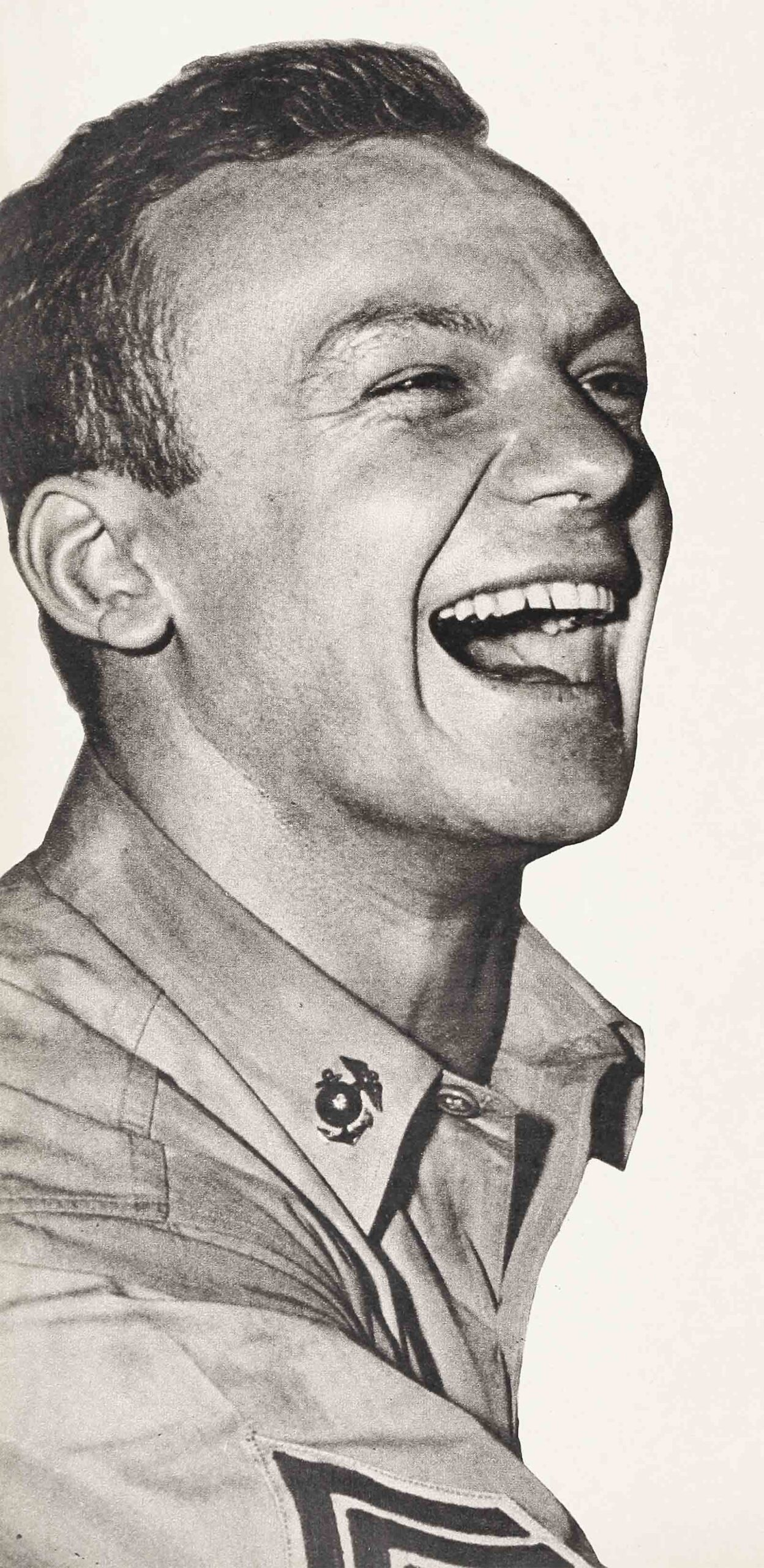
“Don’t Do It The Way I Did!”—Aldo Ray
They’re talking about Aldo Ray.
They’re oh-ing and ah-ing over the job he does as Sergeant O’Hara in Columbia’s “Miss Sadie Thompson.” They’re chuckling and slapping their thighs over the things he says, and the things he does, when guesting on TV. They’re recalling (and are their faces red!) how they said “It’s a fluke,” when in his first picture, “Saturday’s Hero,” husky-voiced he-man Aldo was hailed a “find,” was touted as being star material in the rough and tough tradition of which living legends Gable, Tracy, Cagney, Bogart are made. What but a fluke could turn this small-town constable into a movie actor in less time than it took any one of his famed film “forebears”? And how does a fluke become, so to speak, not a fluke?
Aldo Ray’s answer to that is, “I’m an exception to the rule. Don’t ever do it the way I did it, or you’ll never get there, is the advice I’d give to aspiring actors.”
Chances are you never would get there if you should try to do it the way Aldo did it. For the way Aldo did it shattered precedent, was against all the rules and regulations prescribed for and followed by his fellow stars both now and in the past.
In the first place, Aldo didn’t care—which can be a sword with a two-edged blade. If your indifference to a career is an act, it flops. If you really mean it, it can be a come-on. Aldo really meant it. Aldo never says or does anything he doesn’t really mean. That’s Aldo for you. But—Aldo was in a position to mean it. Before he made “Saturday’s Hero” Aldo had won the primary election for constable in his home town, Crockett, Calif. If being an actor didn’t suit his book, he could go back to Crockett and the campaign he knew would end in a landslide victory.
And that is precisely what he did do.
Aldo felt pretty good when, after “Saturday’s Hero” was finished, the studio bigs said to him, “Stick around, kid, think you’ve got a future.” He felt good, but not surprised.
“I’m not basically inclined to being an actor but I never felt,” Aldo explains, “that I couldn’t be an actor. Never do anything I don’t feel capable of doing. Like living it up, for instance, in the girl department. That is one department, the girl department, I do not excel in! I still haven’t fathomed the mystery of Woman. However, I never would have run for constable of Crockett or parked my dogs in front of a movie camera if I hadn’t knownI was going to win. How do I know?” Aldo shrugs, “it’s a climate, a feeling. An intangible summary of all the elements involved.

“T’m not surprised I’m an actor because, in addition to my practice of never doing anything I don’t feel capable of doing, I always expected to be in the public eye.” (There is an arrogance, virile and exciting, in this big young man.) “But in politics, not movies. To be a good politician, however, you have to have some of the dramatic in you and so, although a movie career was not a thing I’d hankered after, or had to have, there were monetary advantages, so I thought then, and I felt okay when they said ‘Stick around, kid;’ not so okay when they added, ‘But you’ve got a lot to learn, got to carry some spears.’
“A lot to learn. Carry some spears.
“NO.
“Sure I had a lot to learn, and still have. Sure, young actors begin at the beginning, study. But I’ve already sounded the warning not to do it the way I did it. I’ve said I’m an exception to the rule which, the school-books tell you, proves nothing. I’m an exception because acting is neither in my blood nor particularly to my taste. This being so, I don’t want to study things I don’t want to know about. I am not the Art-forArt’s-sake type. I don’t work for Art’s sake. What do I work for? Money. And to be treated decently. And to feel that what I’m doing contributes, in some measure, to others. If people are entertained, made happy by a picture, a performance—then, yes, you’re doing something worthwhile.
“If I’ve got anything to give, let them get it out of me, I thought, as they got it out of me, thanks to director David Miller, in ‘Saturday’s Hero,’ by continuing to give me good directors. If I have rough edges that need smoothing, let them smooth me in a big way.
“Start small, bang your head against the wall, I thought, for years!
“Furthermore, I just didn’t want to be a little fish,” Aldo says, “in that kind of a puddle. I never want to be a little fish in any kind of puddle. I would far rather be a big wheel in a little town than a little wheel in a big town. And that goes for Hollywood, too.

“Back in Crockett I, as constable, could be a big wheel—one with a future, too, for from constable of Crockett to congressman in Washington, D.C., was my goal. Not so tough a goal to make, either, if you’re at all sharp. As a congressman, moreover, I would give people something good. Give them something good or nothing at all is the motto I’d like to live by— whether in Hollywood or in the more august environs where Congress sits.
“So back to Crockett I went, wound up my campaign, was elected constable and went to work with never a backward glance, Hollywood way, nor a twinge of regret that the ‘fluke,’ ” Aldo laughs, “was just that!
“One full year from the time I made my first picture, they called me back, offered me the co-starring role of Judy Holliday’s husband in ‘The Marrying Kind.’
“Well, if they have this much confidence in me I’m sure enough I thought, to gamble. Matter of fact, in a big production like ‘The Marrying Kind,’ there’s not much of a gamble for the actor. You know the best of everything, in material and in manpower, is going into it. You know the chance of success is 95 to 1. In other words, to do it the big way, to hold out for the best way is the way, I still contend, for a fluke to become not a fluke.”
Well, it was Aldo’s way, that’s for sure!
When, a year after he made “Saturday’s Hero,” his one and only picture, Columbia Pictures again “introduced him to the public,” this time as a star, there were orchids, pretty much share and share alike, for Academy Award winner Holliday and one-shot actor Ray.

“The Marrying Kind” was followed by MGM’s “Pat And Mike” in which, with cinema greats Katharine Hepburn and Spencer Tracy, Aldo again came in for his share of the salvos. “Let’s Do It Again,” in which he was co-starred with Jane Wyman and Ray Milland came next and, currently, actor Ray is on the receiving end of greater critical acclaim for his Sergeant O’Hara in “Miss Sadie Thompson.” Next comes “Battle Cry.”
It was—appropriately—when he was testing for “The Marrying Kind,” that Aldo first met Jeff Donnell, the girl he wants to marry.
“Jeff tested Judy’s role with me,” Aldo says, “and, yes, it was love at first sight for me—but not for her. For her, it was second sight. In the girl department, as previously stated, I do not excel!
“However, Jeff and I have been ‘going steady,’ are now going very steady—but not even engaged. Can’t be. I can’t afford to get married.
“The financial potential was, as I’ve rather more than intimated,” Aldo laughs, “what attracted me to the idea of a movie career. It hasn’t worked out that way. I’m still driving the same old car I owned back home. From a beach house, which I rented while making ‘Saturday’s Hero,’ I moved into a nice apartment then into a room in a private home where I’m living now. Of course I know that men get married on far less than I am making. But besides being in love (and I am in love) I am also sensible. Jeff and I both have responsibilities. My father is a workman who sacrificed everything for his family. My mother sacrificed, if possible, even more. When I signed my contract with Columbia Pictures I made up my mind that their sacrificing days were over. So they are, and so they must remain.
“When we marry, I don’t want Jeff to work. If roles that are just right for her come along, I don’t intend to put my foot down and clobber her if she wants to do them. Basically, however, and happily for me, she doesn’t care about a career too much.
“What we want is to get married, settle down and have a big family of children, yep, lots of them. I want a ranch to raise my family on, a real ranch, couple of thousand acres, in northern California.
“Meantime, we’ll just bide our time as we’re biding it now—going to dinner, in modest places, together; going to the movies, the theatre, watching certain TV shows we think we should see. Weekends, we go to football games, do a lot of swimming, go picnicking in the mountains or on the desert, take long drives.
“In time, I may get the money that, for the sake of those dear to me, I have to have. It may be, of course, that some day the Pot of Gold will no longer be at the end of the rainbow in Hollywood. If so I’m going to quit, going to fly the coop, with Jeff under my arm, back to Crockett. Otherwise, I’ll stay where I am, make more pictures—remembering, however, that after each picture it’s still,” Aldo laughs aloud, “a fluke!”
THE END
BY GLADYS HALL
It is a quote. SCREENLAND MAGAZINE MAY 1954




